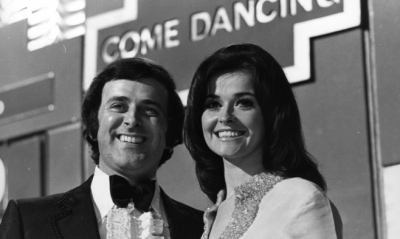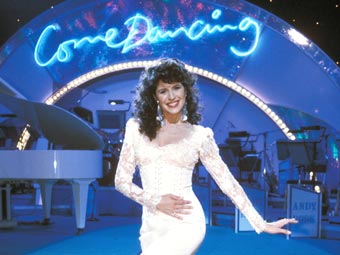Come Dancing
Contents |
Host
Guest hosts (in order, but not including repeat performances): Barrie Edgar, Leslie Mitchell, Eric Morley, MacDonald Hobley, Sylvia Peters, Ron Randell, Jack McGeagh, David Jacobs, Peter Haigh, Peter West, Peter Dimmock, Paul Carpenter, George Elrick (1950-9)
Peter West (1959-72) [*]
Terry Wogan (1973-9) [*]
Peter Marshall (1980-3)
David Jacobs (1984-6) [*]
Angela Rippon (1988-91) [*]
Rosemarie Ford (1992-8) [*]
[*] Hosted the 50th Anniversary special on 29 December 1998
Co-hosts
Regional heats (in order, but not including repeat performances): Archie McCulloch (Scotland 57-8), Nat Allen (West 57), Alun Williams (Wales 57-72), Jack Binks (North 57), Peter West (Midlands 57-9 before becoming host), Alex MacIntosh (mostly East Scotland 57-70), Geoffrey Wheeler (mostly North West, 57-67), Wally Green (West 57-8), Jameson Clark (Scotland, once only, 1958), Ron Boyer (West, once only, 58), John Langham (East, 58-9), Roger Moffat (North East, 58-9), Bill Jack (Scotland, 59-61), Michael Aspel (mostly West, 59-68), MacDonald Hobley (East, 59-60), Leslie Dunn (West Midlands, 59-60), David Coleman (West Midlands, 1960-1), Keith Fordyce (Home Counties South, 59-72), Jack Watson (North East, 59-60), David Jacobs (North London, 59-60), Geoffrey Harvey (East, 60-61), Malcolm Scrimgeour (North West, once, 1960), Peter Haigh (East Midlands, 60-1), Derek Batey (North East, 60-1), Judith Chalmers (North London, 61-5), Martin Muncaster (61-73), Alan Weeks (East Midlands, 62-3), Leonard Maguire (East Scotland, once, 62), Harold Williamson (North East, 62-3), Tom Salmon (?), Athole Still (East Scotland, once, 63), Jimmy Young (Midlands, 61-3), James Lloyd (East, 62-3), Brian Johnston (South London, 62-3), John Johnston (West, 63-4), Gerald Harrison (North, 63), Neville Powley (East, 63-5, North 66-7), Meryl O'Keeffe (Central London, 63-4), Evelyn Elliot (Scotland, 64-5), Bob Welling (South, 64-5), Frank Bough (North, 64-5), Michael Baguley (Northen Ireland, 64), Brian Hoey (Brian Hoey, Wales, once, 65), Malcolm Kellard (Northen Ireland, 64-8), Don Moss (Home Counties, 65-9), Jimmy Henney (South, 65-6), Martin Locke (East Midlands, 65-6), Peter Tuddenham (East, 65-6), Bruce McKenzie (West Scotland 68-9), Mike Neville (North East, 67-70), Jeremy Carrad (South, 66-7), Neil Durden-Smith (North West, 66-7), Billy Raymond (East Scotland, 66-8), Pete Murray (North London, 67-72), John Benson (West Midlands, 67-8), Peter Wheeler (North West, Midlands, 68-72), Barry Chambers (North, 67), John Bassett (East, 67-8), Stuart Hall (floating, 68-73), Tim Brinton (North West, 68-9), Keith Ackrill (West Midlands, 68-70), Barry Alldis (East, 68-70), Larry McCoubrey (Northern irleand, 69-70), Clive Roslin (East Midlands, 69-70), Joe Brady (?), Tim Gudgin (?), Desmond Carrington (North East, 72), Noel Edmonds (?), Terry Wogan (Northern Ireland, 72), David Gell (?), David Findlay (East Scotland, 72), Alan Towers (West Midlands, 73), Ian Masters (North, 72-3), John Craven (West, 72), Barri Haynes (North East, 73), Tom Edwards (East Midlands, 73)
Guest co-hosts for 1976 "Silver Jubilee" series (one show each): Archie McCulloch, Sylvia Peters, McDonald Hobley, Alun Williams, David Jacobs, Peter West, Leslie Mitchell
Commentators:
Barri Haynes (1974-8)
Ray Moore (1979)
Bruce Hammal (1980-4)
Charles Nove (1985-98)
Broadcast
BBC-tv/BBC1, 29 September 1950 to 11 September 1995 (competition format introduced 1953, no series in 1982 or 1987)
International Come Dancing specials: 11 & 18 September 1996 and 2 January 1998 (3 episodes)
"50th anniversary" special: 29 December 1998
Synopsis
In its day, not merely the longest-running gameshow in the land but at one time the longest running British TV show of any kind whatsoever. Launched in 1950 as a sort of companion piece to the already popular Television Dancing Club, the show originally had an educational outlook, with leading dancers of the day instructing viewers in how to do the various dances. After a while the format was re-jigged (if you'll pardon the pun), and in 1952 the familiar regional dance-offs and national final were introduced, with separate categories for each dance.
Series creator Eric Morley was the original Master of Ceremonies, assisted, and then succeeded, by a seemingly endless list of presenters. Just about everyone had a go at it down the years, from the barely-remembered (disc jockey Don Moss) to the fondly recalled (the inevitable Terry Wogan) and the frankly miscast (Noel Edmonds fronting a ballroom dancing competition? It happened.)
 The most well known host of the show, Terry Wogan
The most well known host of the show, Terry WoganTrue enough, the show did seem a little anachronistic for much of its existence, but it did try to move with the times, with new styles like rock 'n' roll and disco added to the existing categories (we don't think there was ever a category for body popping, though). The glamour was always very much to the forefront, with the contestants' dresses always described in loving detail - including those rhinestones, which were invariably "sewn on by hand" (and how else would you attach them? Double-sided sticky tape?)
 One of the later hosts, Rosemarie Ford
One of the later hosts, Rosemarie FordIn the end, Come Dancing became one of those shows, like One Man and His Dog, that were reassuringly always there, yet watched by smaller and smaller audiences. After years of being shunted around in the schedules, the axe finally fell in the mid-1990s.
Inventor
Eric Morley
Trivia
In 1963, the BBC's contract with Mecca Ballrooms (who owned the format) was up for renewal, and some of the ITV companies were looking to poach the show. The BBC couldn't compete financially, so what they did instead was dispatch Alan Whicker to make a special not-for-broadcast edition of Whicker's World about the 70-year-old head of Mecca, Carl Louis Heimann, to leave for his recently-born second son. The gesture paid off, and Come Dancing stayed on the BBC.
Oddly, the BBC's own Strictly Come Dancing Story documentary gave the show a start date of 1948, for which we can find no evidence. They probably conflated it with the aforementioned Television Dancing Club which did indeed start in 1948 but continued its own separate existence until the mid-60s.
Reader Mike Sharp, who put us right on the subject of the attachment of sequins (stuck on with glue) as opposed to rhinestones (sewn on), also notes:
- On the subject of more "with it" dances, I still have the medal I was awarded in 1963/64 for winning the Twist contest when Home Counties South won the overall contest. In passing I was also a member of the winning formation team trained by Peggy Spencer.
The entire 1979 run was repeated by BBC Four in January and February 2023 alongside an episode from 1977 and the Grand Final from 1974. If that wasn't enough, the 1990 final was also repeated on 12 October 2024 to celebrate Angela Rippon's 80th birthday.

